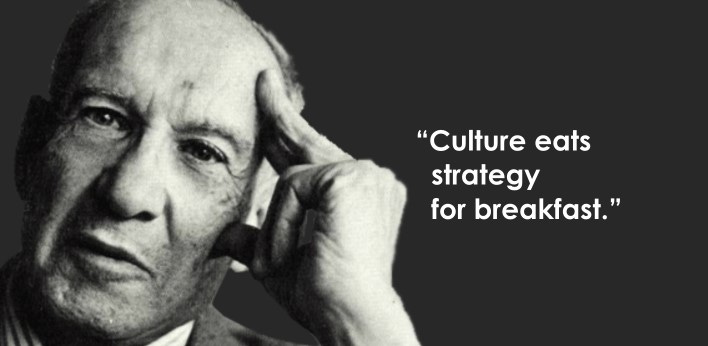Navigating the tension between Culture and Strategy in Sales organizations
A guide to ensuring alignment for Sales success and team well-being
“Culture eats strategy for breakfast.”
— Peter Drucker
When Peter Drucker famously stated that “culture eats strategy for breakfast,” he wasn’t merely referencing business fads or personal preferences. He was shedding light on a fundamental truth: the culture of an organization plays a far more significant role in driving long-term success than even the most well-thought-out strategy. But what exactly do we mean by “Culture” and “Strategy,” and why does this statement matter, particularly for B2B Salespeople?
What is Strategy?
Strategy refers to the overarching plan or roadmap a company uses to achieve its goals and objectives. It’s a structured approach that guides decisions, allocates resources, and ensures the organization stays on course to meet its targets. Strategy is developed, articulated, and decided by top management and then cascaded down to the entire organization.
In the context of a B2B sales team, strategy might involve expanding into new markets, launching new products or solutions, increasing client acquisition, or shifting from transactional sales to long-term partnerships. At its core, strategy is about choice - deciding what to do (and what not to do) - in order to move the company toward specific objectives. It’s intentional, calculated, and measurable. As a Sales Rep, the strategy has already been decided for you, and your role is to implement it.
What is Culture?
On the other hand, culture is less tangible but no less important. It’s the shared values, beliefs, attitudes, and behaviors that shape how people in an organization interact with each other and with customers. Culture manifests in daily practices, rituals, and unwritten rules that guide behavior within the company. It defines an organization’s “personality” and determines how employees engage with their work and one another. Culture is a patchwork that every employee contributes to, with some having a greater impact than others.
For Salespeople, culture can significantly influence how they approach their work and interact with customers - both internal and external. Sales Reps must first take into consideration the overall culture of the organization. Then, they must also factor in the culture of the sales team - whether it’s competitive and independent or collaborative and team-oriented. If these cultures align, things are relatively straightforward. However, if they don’t - and the nature of the sales team itself may explain why - tensions can arise. This is where the challenge lies.
Why does Culture matter more than Strategy?
It’s not that Strategy is irrelevant. Of course, a solid strategy is crucial for any business. However, it’s the Culture that determines whether that Strategy will be embraced, executed, and ultimately successful. As Drucker’s quote suggests, if the company’s culture is at odds with the Strategy, the Strategy will struggle to take root. This is where management plays a critical role.
How Salespeople navigate this tension
Let’s break this down further. Sales teams, for instance, may have a strategy that focuses on aggressively pursuing new clients and hitting high quotas. But if the company’s culture emphasizes collaboration, relationship-building, and long-term client retention, the strategy may feel disjointed or even counterproductive. Salespeople may feel torn between prioritizing short-term targets and aligning with the culture’s focus on nurturing client relationships.
In this case, the design of the incentive system becomes crucial. As we’ve mentioned before, “show me the incentive and I will show you the outcome.” If the incentive structure isn’t aligned with the company’s strategy, Sales Reps may struggle to endorse the broader organizational goals. This misalignment can create friction, lead to burnout, and ultimately impact performance. (More here: The power of Sales Compensation: how incentives drive results).
For Salespeople, adapting to a company’s culture can be particularly challenging. Sales roles often demand a high degree of individual autonomy and competitive drive, which may clash with a company culture that prioritizes teamwork, internal communication, and shared success. Sales Reps are often caught in the delicate balance of performing within a prescribed Strategy while trying to fit into an organizational culture that may not always align with their personal approach to selling.
For example, if a company’s culture values “autonomy” and “innovation,” a salesperson might feel empowered to go above and beyond, exploring creative ways to close a deal. However, if the culture is more “hierarchical” and “structured,” they may struggle with too many checks and balances, limiting their ability to move quickly or take risks.
Aligning Strategy and Culture
The key to overcoming these challenges is alignment. Salespeople who understand the underlying culture of the organization- beyond just the formal strategy - are better positioned to succeed. When Strategy and Culture work together harmoniously, Salespeople can approach their goals with clarity, confidence, and motivation.
Managers play a crucial role in this alignment. It’s essential to ensure that any cultural gaps between the sales organization and the rest of the company are minimal. As a sales team leader, you must recognize that the Culture you nurture shapes the daily actions and interactions of your team. It’s your responsibility to either adapt your approach to fit the broader organizational context or, if necessary, consciously decouple from the main culture. Ultimately, your team’s performance will be evaluated based on how they achieve their targets, not necessarily on how well they align with the broader company’s culture. However, you must also consider the well-being and sanity of your team members. Prolonged misalignment can lead to stress, burnout, and a disengaged workforce.
A clear, well-communicated Strategy that is supported by a culture fostering collaboration, respect, and shared vision enables teams to thrive and exceed their targets. (More here: The Intriguing Concept of 'Team' in Sales: Football or Formula 1?)
Conclusion
In the end, both Culture and Strategy are crucial for a company’s success. Strategy provides direction, while culture shapes the environment in which that strategy is executed. But as Peter Drucker wisely noted, it’s culture that ultimately drives the company forward. For Salespeople, understanding the Culture in which they operate and adapting their Strategies accordingly is key to navigating challenges, building strong relationships, and achieving sustainable success.
For Managers, it is critical to recognize the active role they play in creating and shaping this dynamic environment. When misalignment occurs between the Culture of the organization and that of the sales team, friction is inevitable. One possible outcome could be that salespeople begin to feel disconnected or disengaged from the company.
At the intersection of culture and strategy, it’s the people - and believe it or not Salespeople are … people - who make the difference. Managers should not forget the crucial role they play. By aligning both the culture your Reps work in and the strategy they execute, you’ll equip them to thrive in any organizational environment.



